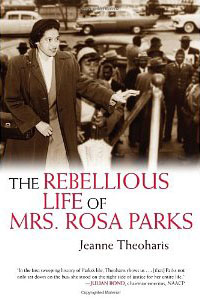Book Notes
 Jeanne Theoharis, The Rebellious Life of Mrs. Rosa Parks (Boston: Beacon Press, 2013), 304pp.
Jeanne Theoharis, The Rebellious Life of Mrs. Rosa Parks (Boston: Beacon Press, 2013), 304pp.
This new biography of Rosa Parks coincides with the 100th anniversary of her birth on February 4, 1913. Remarkably, it's the first comprehensive and critical biography of one of the most important women in American history.
Parks's many awards included a Presidential Medal of Freedom (1996), the highest award given by the executive branch of government, and the Congressional Gold Medal (1999), the highest honor bestowed by the legislative branch. When she died in 2005 at the age of 92, Parks became the first woman, the second black, and only the third private citizen to lie in honor in the Capitol Rotunda.
Most people remember Rosa Parks for her iconic act on December 1, 1955 in Montgomery, Alabama. After working all day as a seamstress at a department store, at about 6PM Parks boarded a bus to go home. She paid her fare and sat down in the first row of seats that were reserved for blacks. When the front of the bus reserved for white people filled up, the bus driver moved the "colored" sign behind Parks, then told her and three other blacks to move to the back to accommodate the white passengers. Her three seat mates moved; Rosa Parks did not.
"When that white driver stepped back toward us," she later recalled, "when he waved his hand and ordered us up and out of our seats, I felt a determination cover my body like a quilt on a winter night."
"When he saw me still sitting, he asked if I was going to stand up, and I said, 'No, I'm not.' And he said, 'Well, if you don't stand up, I'm going to have to call the police and have you arrested.' I said, 'You may do that.'"
The bus driver did call the police, who arrested Parks for violating Montgomery's segregation laws. She was also fired from her job. About twenty-four hours later, a friend bailed her out of jail. Her calculated act of civil disobedience jump started the Montgomery Bus Boycott three days later on December 4. The non-violent protest lasted 381 days, until the Supreme Court ruled in Browder v. Gayle (1956) that bus segregation was illegal.
Theoharis's new biography dispels two common myths about Rosa Parks. First, she was no meek or accidental heroine. In fact, Parks had been an active leader in the civil rights movement since 1943, when she joined the NAACP. This was at a time when such work was dangerous, demoralizing, and difficult. "People always say that I didn't give up my seat because I was tired, but that isn't true. I was not tired physically, or no more tired than I usually was at the end of a working day. I was not old, although some people have an image of me as being old then. I was forty-two. No, the only tired I was, was tired of giving in."
And second, her refusal to give up her seat was not the random act of a single day. Earlier that summer, for example, she had attended a school in Tennessee for civil rights training. Rather, Theoharis shows how Parks dedicated sixty years of her life to political activism in the cause of social justice. In Parks's own words, "I had almost a life history of being rebellious against being mistreated because of my color" (and thus the title of the book).
Her bravery came at a cost. Throughout her life she received death threats and hate mail. For a decade after the Montgomery bus boycott, until she was hired by John Conyers after she moved to Detroit, she was herself unemployable and suffered severe economic hardship. Slander was a constant experience. Theoharis clearly wants to find a historically revised Rosa Parks, one that gives honor to whom honor is due, rather than one in which American democracy celebrates itself for its resilience and redemptive power that has moved us to a post-racial society. Her demythologized Rosa Parks burns all the brighter as the genuine "mother of the civil rights movement."


